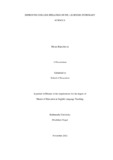
Please use this identifier to cite or link to this item:
https://hdl.handle.net/20.500.14301/258Full metadata record
| DC Field | Value | Language |
|---|---|---|
| dc.contributor.author | Bajracharya, Manju | - |
| dc.date.accessioned | 2023-04-30T07:07:14Z | - |
| dc.date.available | 2023-04-30T07:07:14Z | - |
| dc.date.issued | 2012-11 | - |
| dc.identifier.citation | Bajracharya.M.(2012).Improving english spellings of EFL learners in primary schools. | en_US |
| dc.identifier.uri | https://hdl.handle.net/20.500.14301/258 | - |
| dc.description.abstract | Every day, we need to write in order to complete our tasks, whether we are filling out a form or writing an important letter. These tasks require us to write clearly, correctly and organize information effectively. Whether students are writing by hand or on the computer, many assignments and examinations require them to write short answers or longer essays. As students get older, they are expected to show more sophisticated writing skills and to complete more sophisticated writing tasks. Employees in many kinds of jobs are required to write on a daily basis. Whatever the task, their ability to do their job well may depend on their ability to write. Many job applicants also must submit a resume and a letter of application when applying for a new job. Writing is frequently the final stage in communication when we want to leave no room for doubt, which is why we write and sign contracts, leases, and treaties when we make important decisions. It's important to remember that writing can be as difficult as a subject to teach and assess as it is to learn. Many students have a trouble in writing with clarity, coherence, organization, and spellings which can discourage them from writing if they feel frustrated. That's where teacher’s involvement can make a big difference. Encouraging a child to develop a strong writing skills especially in spelling at a young age and to become a better writer as she/he gets older; can have a lifelong positive impact on her/his writing. Given this scenario, I focused my research on the strategy that the learners would adopt to learn the English spelling. The question like ‘How to improve the English spelling scores of the learners and how to make them aware of their spelling mistakes?’ always stroke in my head that lead me to do this action research. Therefore, I have implemented the different tasks, games and techniques for the learners to improve their spelling. Thus, rigorous literature review was done before the field work that showed the way to the strategies for the learners. Qualitative methodological approach was followed focusing on the philosophical considerations. The methodology selected for this study is appropriate because the purpose of the study is to develop confidence in students and the method helps them to learn spelling in interesting and fun way without being frustrated of the spelling scores. Quality standard of the research is addressed to maintain the validity of the study. The outcomes of the research indicate that teaching and learning spelling have got less priority than other writing parts. Therefore, my research may help to facilitate and guide the English teachers as well as other subject teachers who are facing this type of problem during their teaching and learning process. This research motivates the learners who are careless in spelling but wants to improve for strong writing. The strategies that I used were taken as the good techniques by the learners and interesting way to learn the spelling. Their improvement in the writing spelling with the help of the strategies was seen in English subject well as in other subjects. The marks in examination were also increased. Therefore, the outcome of this action research is positive due to the improvement of spelling of the learners. | en_US |
| dc.language.iso | en | en_US |
| dc.title | IMPROVING ENGLISH SPELLINGS OF EFL LEARNERS IN PRIMARY SCHOOLS | en_US |
| dc.type | Dissertation | en_US |
| local.school.name | SOED | en_US |
| local.school.department | DOLE | en_US |
| local.school.program | Master of Education in ELT (2 years) | en_US |
| local.school.level | Masters | en_US |
| Appears in Collections: | Research Report | |
Files in This Item:
| File | Description | Size | Format | |
|---|---|---|---|---|
| Manju final version.pdf | 5.73 MB | Adobe PDF |  View/Open |
Items in DSpace are protected by copyright, with all rights reserved, unless otherwise indicated.